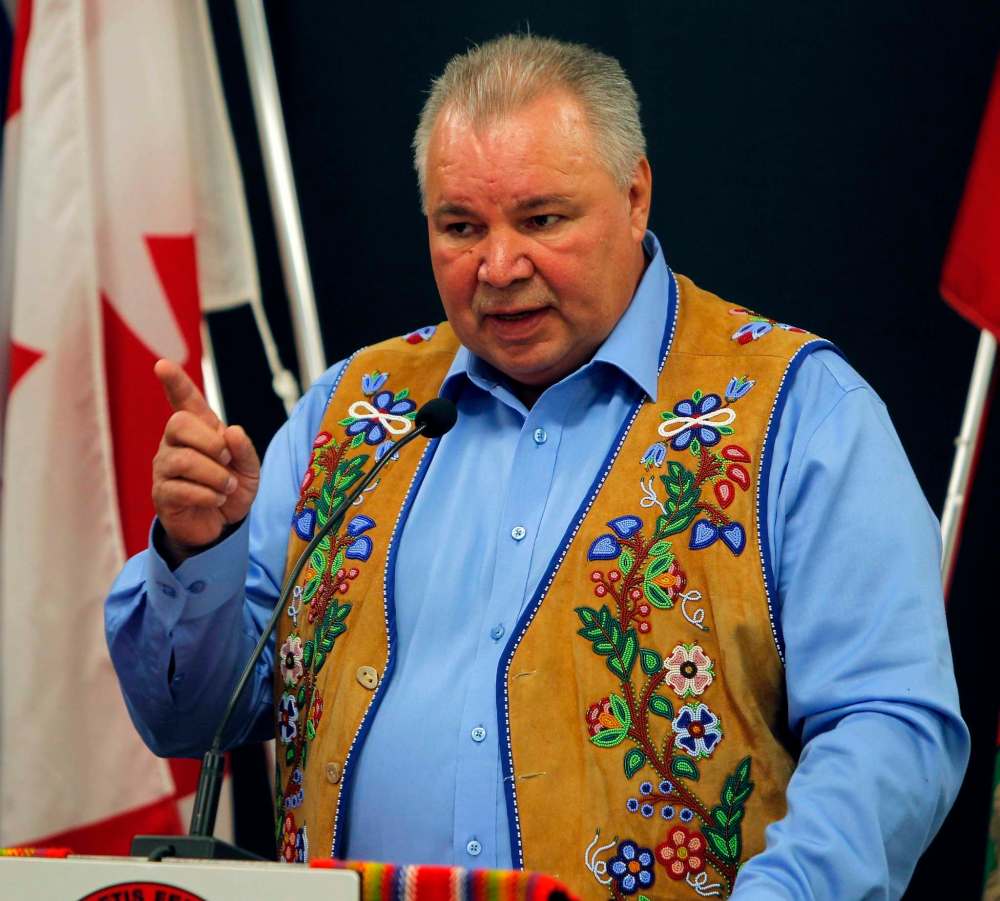Premier calls deal ‘hush money’
Métis president says province paid more to affected farmers
Advertisement
Read this article for free:
or
Already have an account? Log in here »
To continue reading, please subscribe:
Monthly Digital Subscription
$19 $0 for the first 4 weeks*
- Enjoy unlimited reading on winnipegfreepress.com
- Read the E-Edition, our digital replica newspaper
- Access News Break, our award-winning app
- Play interactive puzzles
*No charge for 4 weeks then billed as $19 every four weeks (new subscribers and qualified returning subscribers only). Cancel anytime.
Read unlimited articles for free today:
or
Already have an account? Log in here »
Hey there, time traveller!
This article was published 21/03/2018 (2228 days ago), so information in it may no longer be current.

The vitriol over the Manitoba Hydro board’s mass resignation soared Thursday as Premier Brian Pallister called a tentative agreement between the Crown corporation and the Manitoba Metis Federation “hush money.”
“We object to the very idea that a government would condone such a purchase of people’s inalienable rights, that we would buy off people’s concerns with hush money,” he told the house.
There are widely differing interpretations of just what the contentious proposal says, what it would do, why it was negotiated and what it would cost.
Pallister said he ordered the Hydro board not to proceed with what he calls a $70-million payment to persuade the federation not to oppose a transmission line deal with Minnesota. (On Wednesday, nine of 10 Tory-appointed board members resigned.)
Cabinet’s directive to Hydro
“Manitoba Hydro is directed to not proceed with the agreement with the Manitoba Metis Federation at this time.
“Going forward, all relationship agreements, community benefit agreements or other similar agreements to which this directive applies between Manitoba Hydro and Indigenous communities and groups require review by the minister of Crown services before being executed.
“Further, to ensure alignment between the policies and procedures of Manitoba Hydro and the policies and procedures of the government, Manitoba Hydro is directed to collaborate with Manitoba Crown Services to develop a strategy to advance reconciliation with Indigenous communities and groups.”
Federation president David Chartrand said it’s a $67.5-million agreement spread out over 50 years and flows from recommendations of the Truth and Reconciliation Commission.
Former Hydro chairman Sanford Riley said the utility has been signing such agreements for decades, and it follows a Supreme Court of Canada ruling on respecting the rights of Indigenous people.
The tentative agreement is somewhere among those extremes, and is complex.
It calls for Hydro to pay the federation $1.5 million a year for 20 years.
There would also be a $37.5-million lump sum to the federation, to be placed in a trust fund “to improve the overall quality of life in the Manitoba Métis community,” with a requirement to maintain a minimum of 33 per cent in the fund for the first 20 years.
Other clauses required Hydro to provide funding to the Métis for future projects licensed after the first 20 years, but within the following 30 years, including payments equal to two per cent of the estimated capital cost of the transmission-line-portion-only of projects.
In return, the federation would withdraw any opposition to the Minnesota link, and would agree to support Hydro’s applications for existing and future applications during those 50 years. The Métis people would “agree not to appeal or contest any approvals or licences issued with respect to any of the identified projects or future transmission projects,” the proposed agreement says.
Pallister said the proposal is without precedent.
“Métis people would not disagree with a project in the future, (even though) they don’t know what the project would be,” the premier said Thursday.
He accused defenders of the axed deal of stripping “children yet unborn” of their democratic right to oppose Hydro projects on their land.
“This would be like a father selling his daughter’s voting rights,” Pallister told reporters. “It purports to give away a right in the future.”
While verbally jousting with Manitoba NDP Leader Wab Kinew, the premier said the agreement would have opened both Hydro and the province up to potentially hundreds of millions of dollars of payments on major projects.
“How big a cheque is (Kinew) prepared to cut to Dave Chartrand so we can get an outlet to Lake Manitoba?” the premier said in the house.
“I do not want a delay on the construction of an outlet on Lake Manitoba,” he later told reporters. But, “I won’t step on people’s rights.”
Kinew scoffed that Pallister was “babbling” and doesn’t understand that best business practices involve paying to mitigate future risk.
In an interview Thursday, Riley said Hydro has for decades entered into arrangements with First Nations, and it’s a big part of its job. Given the results of several Supreme Court of Canada cases in recent years, Hydro realized jurisprudence had put the Métis people “on a similar footing to First Nations.”
Riley called the tentative agreement “a good deal for Manitoba” because its impact will extend for 50 years. He noted it covered a multiplicity of projects — and not simply a power transmission line to the Minnesota border.
He said he was “offended” Pallister referred to the $67.5-million plan as “hush money.”
Riley said the board had formally approved the proposed deal with the Métis, subject to the province’s approval. It sent a copy to the Progressive Conservative government in November 2017, because it recognized the document was “unusual” and “innovative.”
It is one of several reasons the board recently sought to meet with Pallister and his cabinet, Riley said.
Kinew accused Pallister of refusing to talk and listen to “the brain trust of our business community in Manitoba” by brushing off his own hand-picked Hydro board. “This issue is entirely caused by the premier’s mismanagement,” the NDP leader said.
Contacted Thursday afternoon in B.C., Chartrand said the proposal involves less money than the total amount paid out to farmers along the planned Manitoba-Minnesota transmission line.
The $37.5-million up front was intended to both protect Hydro from climbing interest rates, while allowing the federation to benefit from those higher interest rates, Chartrand said, and would be spent over 50 years.
“It ensures past our lifetime that the money will be available — it will outlast us all.”
The tentative agreement would also have withdrawn any Métis opposition to new transmission lines planned in the next 20 years — but only small ones, he said, insisting the Métis people would not be prevented from taking a stance on major new projects.
Chartrand said the federation’s lawyers, and the government lawyers with whom they deal, were “caught off guard. They’re completely shocked like we are… (Pallister is) handling it from the seats of his pants.”
The federation will hold a news conference next week. “I’m going to show this guy for what he is,” the Métis organization president said of Pallister.
Chartrand said he’s had no formal contact with the premier since the 2016 provincial election. “When he was in opposition, I couldn’t get rid of the guy — I’ve never had a chance to meet with the guy since he got elected.”
nick.martin@freepress.mb.ca
larry.kusch@freepress.mb.ca

Larry Kusch
Legislature reporter
Larry Kusch didn’t know what he wanted to do with his life until he attended a high school newspaper editor’s workshop in Regina in the summer of 1969 and listened to a university student speak glowingly about the journalism program at Carleton University in Ottawa.





